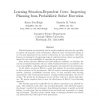Free Online Productivity Tools
i2Speak
i2Symbol
i2OCR
iTex2Img
iWeb2Print
iWeb2Shot
i2Type
iPdf2Split
iPdf2Merge
i2Bopomofo
i2Arabic
i2Style
i2Image
i2PDF
iLatex2Rtf
Sci2ools
134
click to vote
AGENTS
1998
Springer
1998
Springer
Learning Situation-Dependent Costs: Improving Planning from Probabilistic Robot Execution
Physical domains are notoriously hard to model completely and correctly, especially to capture the dynamics of the environment. Moreover, since environments change, it is even more important for the system to learn from its own experiences. Our work focusses on learning for the planning stages of a physical system, where our algorithm learns the costs and probabilities of operating the environment. Since actions may have di erent costs under di erent conditions, we introduce the concept of situation-dependent rules, in which situational features are attached to the costs orprobabilities, re ecting patterns and dynamics encountered in the environment. In this article, we present Rogue, a robot that analyzes its execution experiences to detect patterns in the environment. Rogue extracts learning opportunities from massive, continual, probabilistic execution traces. It then correlates these learning opportunities with environmental features, creating situation-dependent costs for its act...
Related Content
| Added | 05 Aug 2010 |
| Updated | 05 Aug 2010 |
| Type | Conference |
| Year | 1998 |
| Where | AGENTS |
| Authors | Karen Zita Haigh, Manuela M. Veloso |
Comments (0)

